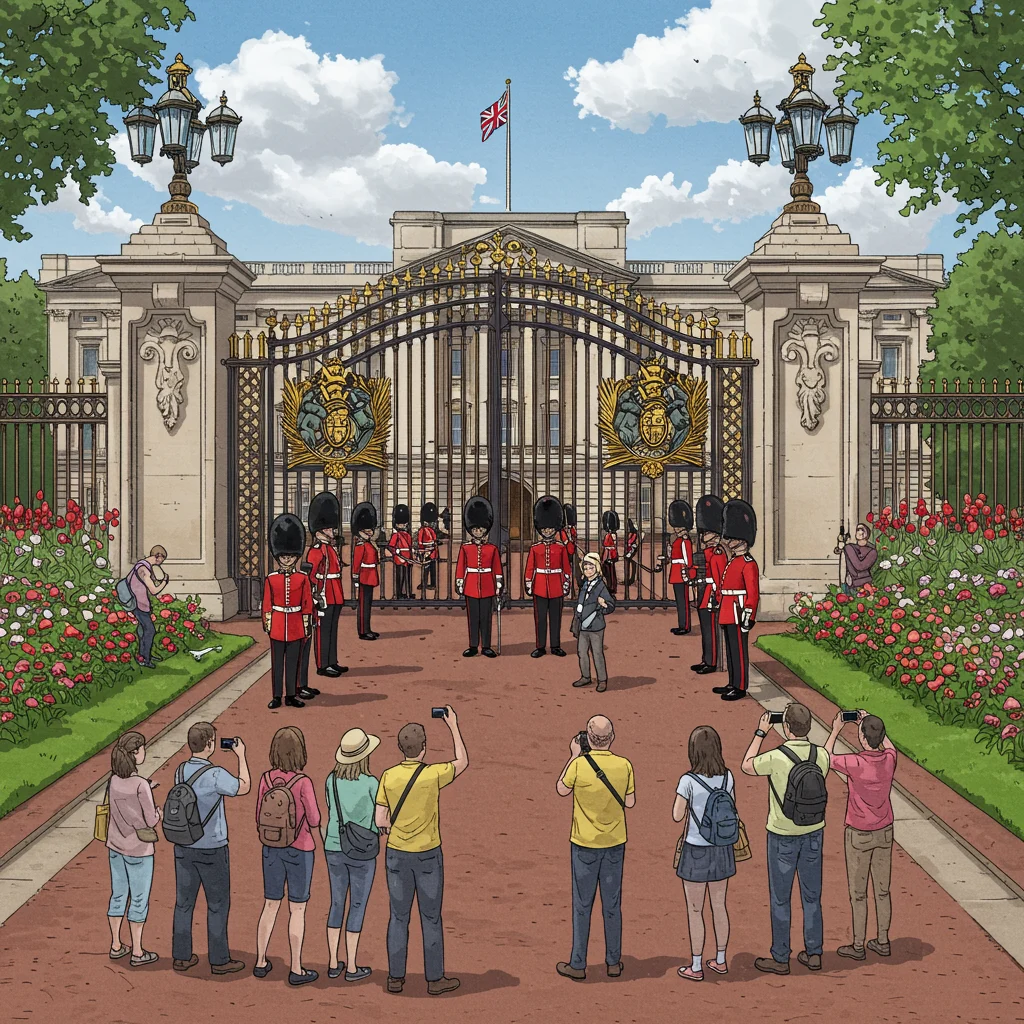Introduction to the Changing of the Guard Guided Tour
The Changing of the Guard guided tour at Buckingham Palace offers an immersive way to witness one of London’s most celebrated traditions. Visitors gather in anticipation as the crisp sound of boots echoes across the courtyard, brilliant red tunics catch the sunlight, and the regimental band fills the air with music. With an expert guide, guests gain insider knowledge and context that transforms this iconic spectacle from a simple ceremony into a fascinating journey through history, pageantry, and royal tradition.

For those who appreciate ceremonial grandeur and British heritage, this tour provides a unique opportunity to experience the event up close, learn about the guards’ duties, and understand the significance of every detail. The tour’s thoughtful structure ensures that even first-time visitors feel informed and engaged throughout.
What Is the Changing of the Guard Ceremony?
The Changing of the Guard ceremony is a formal event during which the soldiers responsible for guarding Buckingham Palace are relieved by a new shift. This tradition is marked by precise marching, musical accompaniment, and a display of military discipline. The ceremony is a symbol of the monarchy’s enduring presence and a highlight for tourists visiting London.
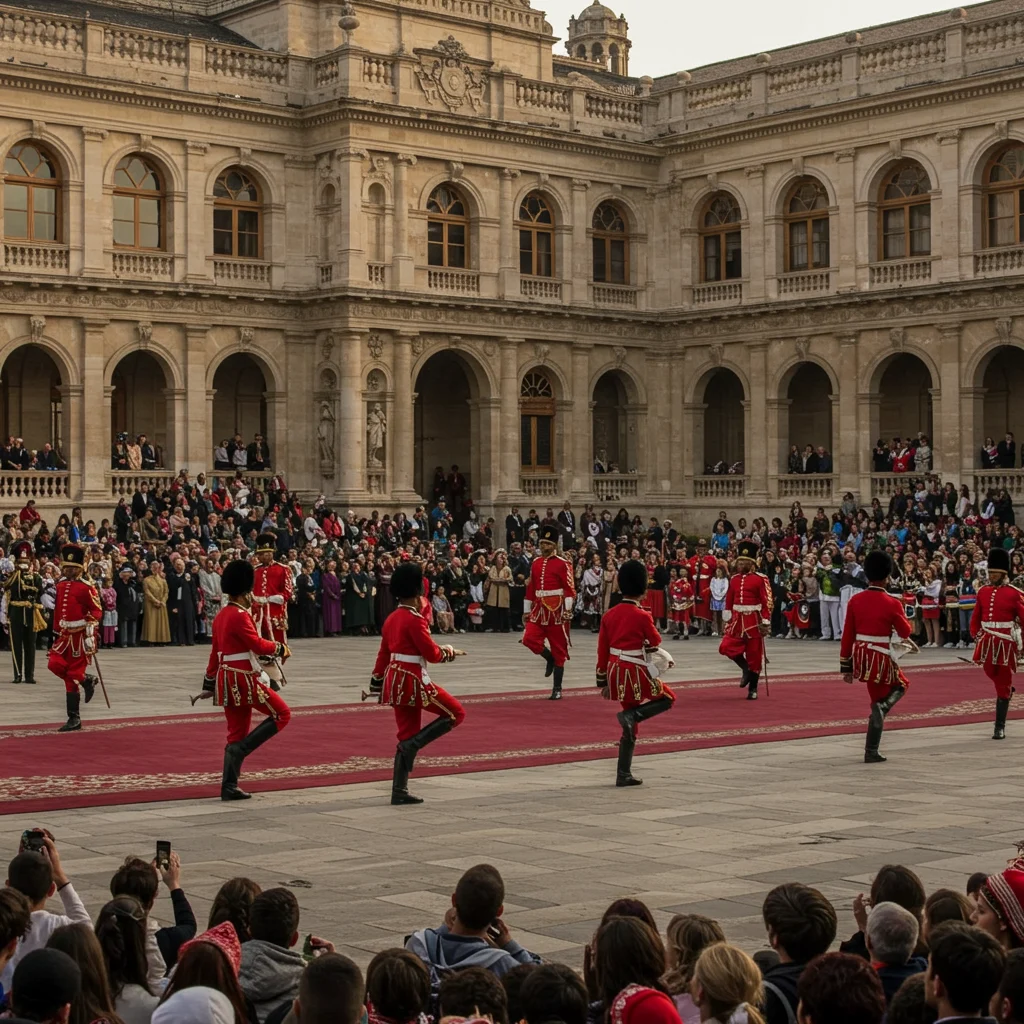
Why Is the Changing of the Guard So Famous?
People from around the world flock to Buckingham Palace to witness the Changing of the Guard because of its unique blend of military precision, vibrant uniforms, and historical resonance. The spectacle is renowned for its meticulous choreography and the awe-inspiring sight of guards moving in perfect unison.
This ceremony has become one of London’s most photographed and shared attractions, much like other globally recognized experiences such as the London Eye, offering visitors a quintessential taste of British culture.
Historical Background of the Ceremony
The roots of the Changing of the Guard ceremony reach deep into British history. Each element of the event reflects centuries of royal tradition and military evolution, making it a living link to the United Kingdom’s storied past.
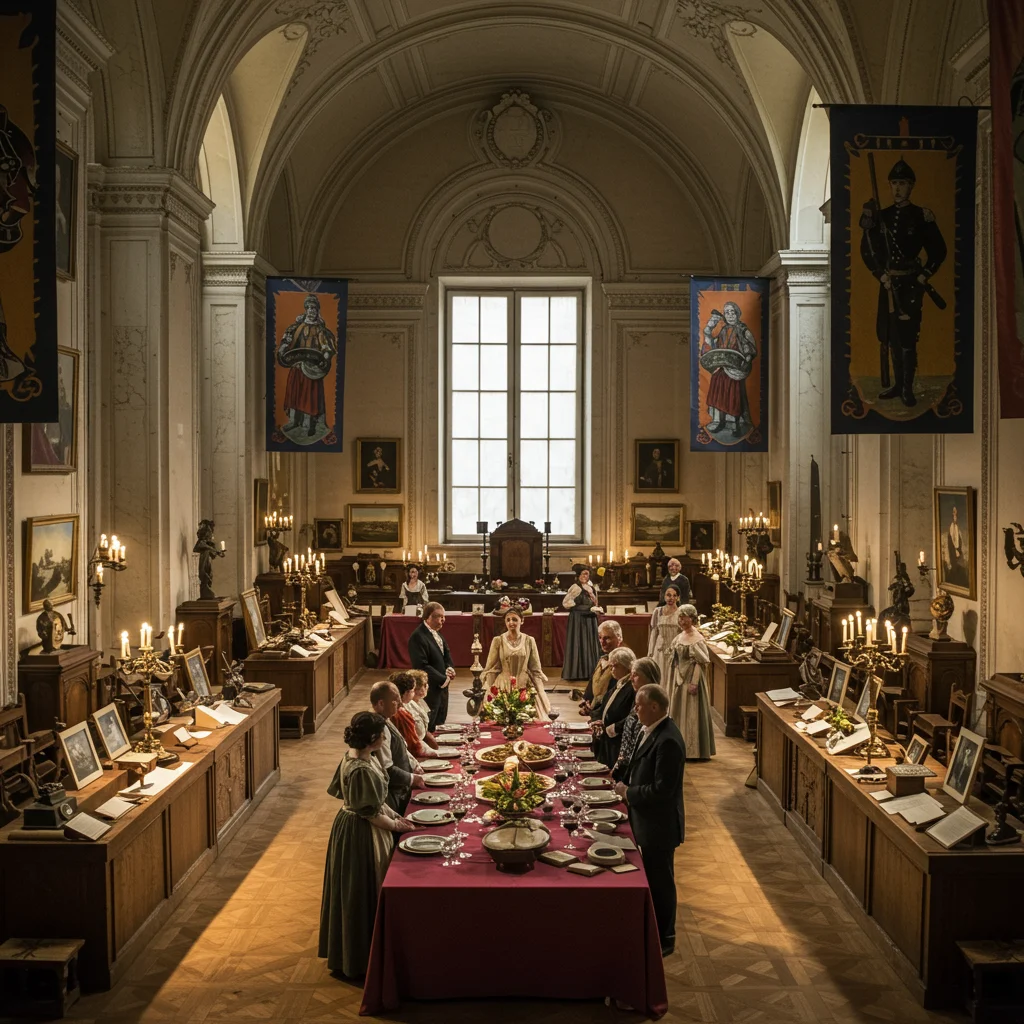
Origins of the Tradition
The practice of changing guards at royal residences began in the 17th century, when King Charles II reinstated the monarchy. Initially a practical security measure, the ceremony quickly gained symbolic importance, representing the monarch’s protection and authority.
Evolution Over the Centuries
Over time, the ceremony has adapted to changing circumstances and tastes. The introduction of music, the evolution of the guards’ uniforms, and the refinement of the marching sequences have all contributed to the event’s current form. Today’s ceremony is a blend of tradition and spectacle, carefully maintained for modern audiences.
Significance in British Culture
The Changing of the Guard is more than a tourist attraction—it is a proud expression of British identity. The ceremony embodies values such as discipline, loyalty, and continuity. For many, it serves as a tangible connection to the monarchy and national history, much like how heritage tours in other cities, such as those in Savannah and Charleston, help visitors appreciate architectural and cultural legacies.
Buckingham Palace: An Iconic Venue
Buckingham Palace stands as the centerpiece of the Changing of the Guard ceremony. Its stately façade, gilded gates, and ceremonial forecourt provide an unforgettable backdrop for this revered event.
![]()
A Brief History of Buckingham Palace
Originally built as Buckingham House in 1703, the palace became the official London residence of the British monarch in 1837. Since then, it has served as the heart of royal events, state occasions, and daily governance, making it one of the world’s most recognized palaces.
Architectural Highlights
Buckingham Palace is renowned for its neoclassical design, sweeping front courtyard, and the iconic balcony where the royal family appears during major celebrations. Visitors often marvel at the intricate ironwork of the gates, the grandeur of the Victoria Memorial, and the symmetry of the palace’s wings.
Why Is Buckingham Palace the Home of the Ceremony?
The palace’s role as the monarch’s residence makes it the natural stage for the Changing of the Guard. Its central location, historical significance, and ceremonial spaces allow the tradition to unfold in full view of the public, reinforcing the bond between the monarchy and the nation.
What to Expect on the Guided Tour
Joining a guided tour of the Changing of the Guard elevates the experience by providing expert commentary, prime viewing spots, and a deeper understanding of the ceremony’s nuances. Guides share stories, answer questions, and ensure guests don’t miss any key moments.

Overview of the Tour Experience
Participants meet at a designated location near Buckingham Palace, where their guide provides an introduction and sets the stage. The group then moves to strategic vantage points to observe the guards’ arrival, the handover, and the regimental band’s performance. Throughout, guides offer fascinating insights and historical anecdotes.
Duration and Schedule of Tours
Most Changing of the Guard tours last between 1.5 and 2.5 hours, aligning with the ceremony’s schedule. Tours typically begin 30–45 minutes before the official start time to secure optimal viewing positions and conclude shortly after the ceremony ends.
Tour Group Sizes and Accessibility
Group sizes can range from intimate gatherings of 10 to larger groups of 25 or more. Many operators offer accessible routes and accommodations for visitors with mobility needs, ensuring everyone can enjoy the experience.
How to Book a Changing of the Guard Guided Tour
Securing a spot on a Changing of the Guard guided tour is straightforward, with several booking options available to suit different preferences and schedules.
Booking Online vs. In-Person
Most visitors prefer booking online in advance to guarantee availability and lock in preferred dates. Online booking platforms, such as Viator, allow you to compare options, read reviews, and select the tour that best fits your needs. In-person booking is possible at select ticket offices in central London, but availability may be limited, especially during peak seasons.
Recommended Tour Operators
Several reputable operators offer guided tours of the Changing of the Guard, each bringing their own expertise and approach. When choosing an operator, consider factors such as group size, guide credentials, and customer feedback. Many travelers find tours through Viator to be reliable and well-organized, simplifying the process of planning your trip.
Pricing and Ticket Options
Ticket prices vary based on the length of the tour, group size, and included amenities. Standard tours generally start around £20–£30 per adult, with discounts for children and families. Some operators offer premium packages that include additional attractions or skip-the-line benefits.
Best Times to Attend the Ceremony
Timing can significantly enhance your experience of the Changing of the Guard. Factors such as season, weather, and crowd levels all play a role in determining the best day and time for your visit.

Seasonal Variations and Schedules
The ceremony typically takes place on Mondays, Wednesdays, Fridays, and Sundays from April to July, and on alternating days during the rest of the year. Schedules can change due to state events or weather, so it’s wise to verify the timing before planning your visit.
Weather Considerations
London’s weather can be unpredictable. Rain or extreme conditions may result in a modified or canceled ceremony. Dress appropriately for the season—layers, waterproof jackets, and comfortable shoes are recommended, especially if you plan to stand outside for an extended period.
How Early Should You Arrive?
Arriving at least 45 minutes before the ceremony ensures you find a good viewing spot. Early arrival is especially important during summer and on weekends, when crowds are at their largest.
Where Does the Changing of the Guard Take Place?
The Changing of the Guard unfolds across several locations within and around Buckingham Palace, each contributing to the ceremony’s grandeur and accessibility for visitors.
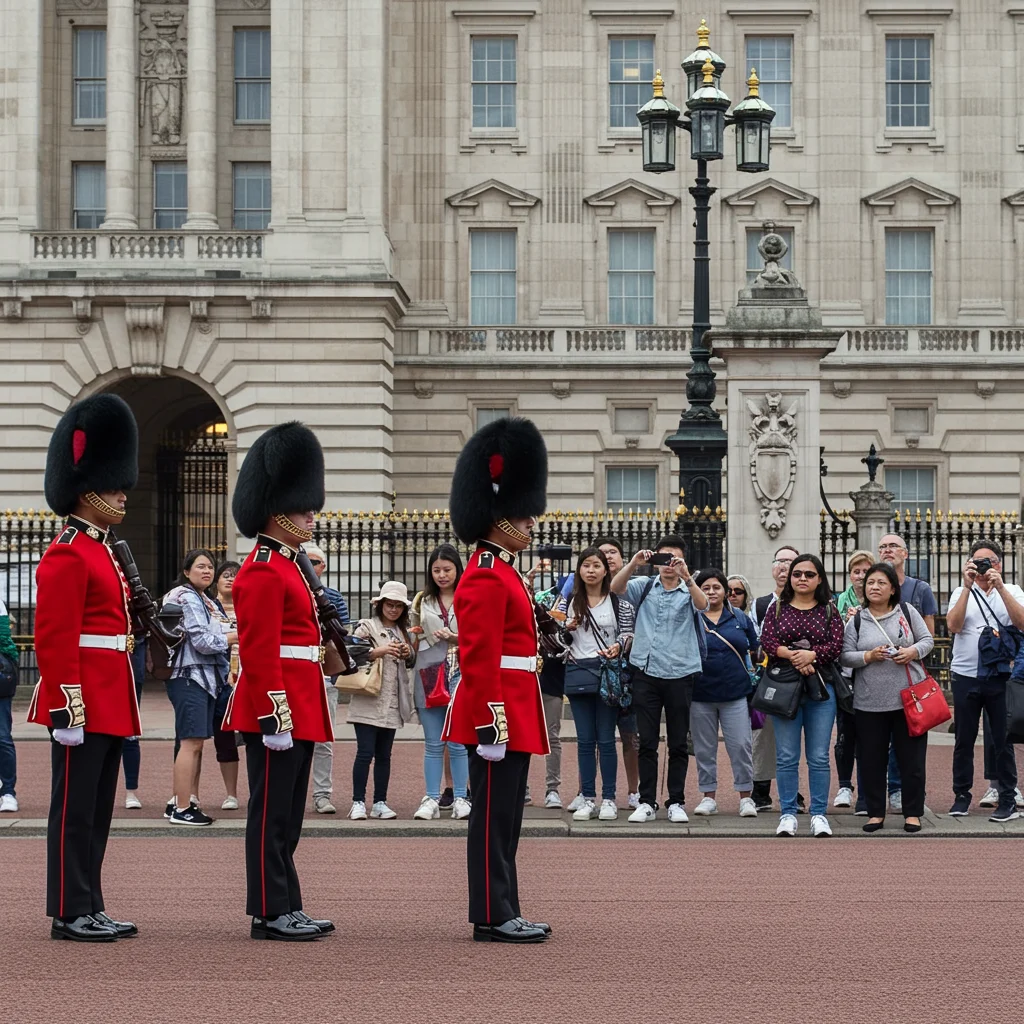
Key Locations Within Buckingham Palace
The primary action occurs on the palace forecourt, just behind the ornate gates facing The Mall. The Victoria Memorial, situated directly in front of the palace, also serves as a focal point for spectators and photographers.
Best Viewing Spots for the Ceremony
Prime viewing areas include the railings directly in front of Buckingham Palace, the steps of the Victoria Memorial, and the stretch along The Mall. Each spot offers a different perspective—whether you want to see the guards up close or capture sweeping shots of the entire event.
Route of the Guards
The guards march from Wellington Barracks, along Birdcage Walk, and into the palace forecourt. The return route follows the same path, offering multiple chances to see the marching columns and hear the band’s music reverberate through the city streets.
What Will You See During the Ceremony?
From the thunderous rhythm of boots to the gleaming brass instruments, the Changing of the Guard is a sensory feast. Each phase of the ceremony is carefully choreographed, offering visitors a series of memorable moments.

The March of the Guards
The ceremony begins with the Old Guard assembling in front of the palace. The New Guard, led by a regimental band, marches from Wellington Barracks with crisp precision. The synchronized movements and sharp commands create an atmosphere of discipline and anticipation.
The Role of the Regimental Band
The regimental band provides a stirring soundtrack, performing traditional marches and popular tunes. Their music amplifies the ceremony’s drama, and the sight of musicians in full dress uniform is a highlight for many guests.
Uniforms and Insignia Explained
The guards’ uniforms are instantly recognizable—red tunics, dark navy trousers, and the iconic bearskin hats. Each regiment has distinctive insignia, buttons, and plumes that signify their unique history and role within the British Army.
Key Moments to Watch For
Visitors should pay attention to the formal handover of the palace keys, the inspection of the New Guard, and the coordinated salute at the end. These moments encapsulate the ceremony’s symbolism and tradition.
Who Are the Guards?
The soldiers participating in the Changing of the Guard belong to some of the most storied regiments in the British Army. Their training, discipline, and appearance are a source of national pride.

Regiments Involved in the Ceremony
The ceremony is typically performed by one of the five regiments of Foot Guards: Grenadier, Coldstream, Scots, Irish, and Welsh Guards. Each is distinguished by unique insignia and traditions, and their rotation ensures that the ceremony remains fresh and engaging.
Selection and Training of Guards
Guards are selected based on exemplary service, physical fitness, and ceremonial skill. Their training is rigorous, emphasizing both military duties and the precision required for public ceremonies.
As experts often say:
“Ceremony is the visible language of tradition, and those who perform it are its most dedicated storytellers.”
The Meaning Behind the Uniforms and Bearskins
The bearskin hats, originally designed to make soldiers appear taller and more imposing, are now a symbol of honor and continuity. Each detail of the uniform, from the arrangement of buttons to the color of the plume, tells a story about the regiment’s heritage.
The Guided Tour Experience in Detail
A guided tour of the Changing of the Guard goes beyond mere observation, offering layers of context and the opportunity for meaningful engagement with history and tradition.

What Does the Guide Explain?
Guides share stories about the regiments, decode the symbolism of the uniforms, and highlight the significance of each ceremonial step. Their expertise helps visitors appreciate details that might otherwise go unnoticed.
Interactive Elements and Q&A Sessions
Many tours include interactive elements, such as quizzes or trivia, to keep participants engaged. Guides often encourage questions, creating a welcoming environment for curiosity and discussion.
Behind-the-Scenes Insights
Guides may share behind-the-scenes anecdotes about the guards’ daily routines, the challenges of maintaining tradition, and even humorous stories from past ceremonies. This personal touch enriches the experience and leaves a lasting impression.
Photography and Filming Tips
The Changing of the Guard is a photographer’s delight, with vivid colors, dramatic movements, and regal architecture providing endless inspiration. Capturing the perfect shot requires a blend of preparation and creativity.
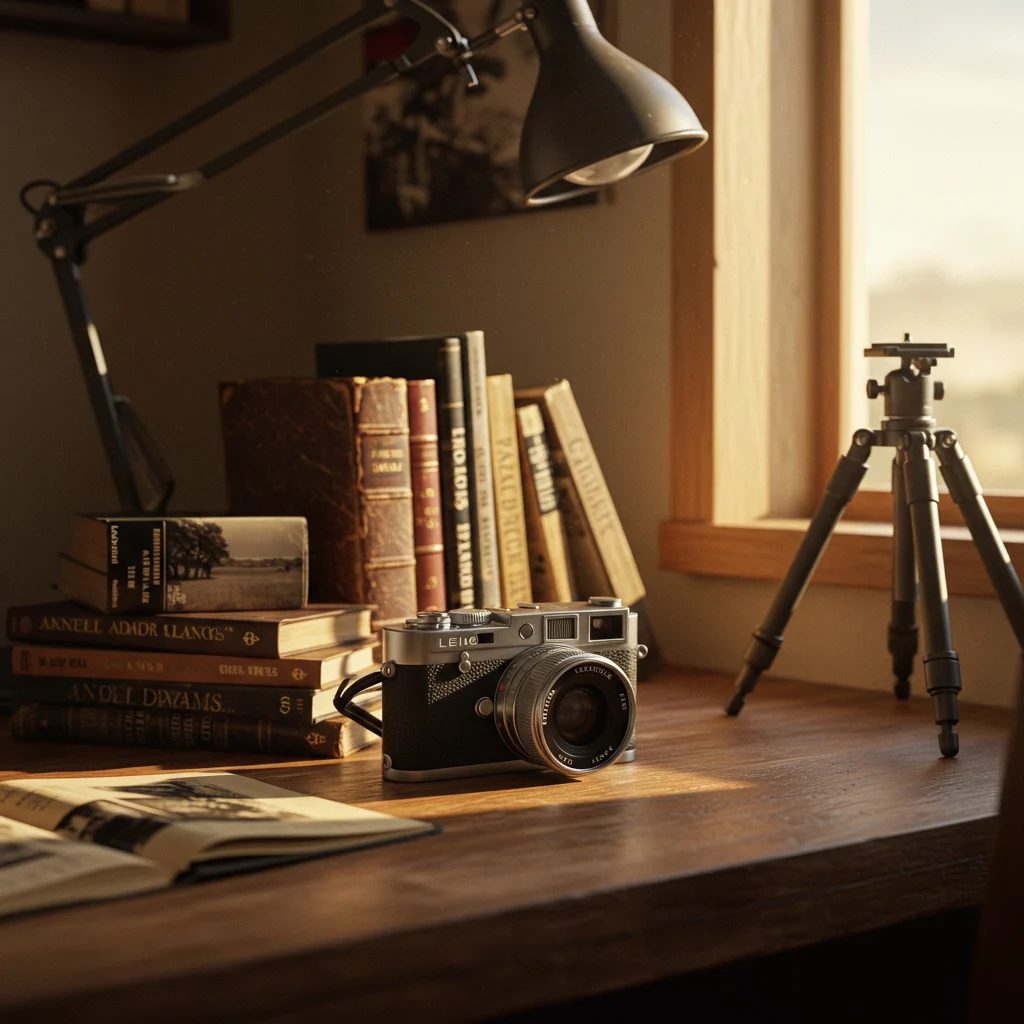
Are Photos Allowed During the Ceremony?
Photography is permitted during the ceremony, but visitors should remain respectful and avoid obstructing others’ views. Flash photography is discouraged, as it can distract the guards and detract from the atmosphere.
Best Camera Angles and Equipment
Wide-angle lenses are ideal for capturing the entire scene, while telephoto lenses allow for close-ups of uniforms and facial expressions. The steps of the Victoria Memorial and the railings along The Mall provide excellent vantage points.
Tips for Capturing the Best Shots
- Arrive early to secure a front-row position.
- Use burst mode to capture marching sequences.
- Frame shots to include both the guards and the palace façade for context.
- Be mindful of the changing light and weather conditions for optimal exposure.
Practical Information for Visitors
Preparing for your visit to the Changing of the Guard ensures a smooth and enjoyable experience. Consider factors such as attire, security, facilities, and accessibility when planning your day.

What Should You Wear?
Comfortable shoes and weather-appropriate clothing are essential, as much of the experience involves standing outdoors. In summer, a hat and sunscreen are advisable, while winter visitors should dress in warm layers.
Bag and Security Guidelines
Large bags and backpacks may be subject to search, and some areas restrict access for security reasons. Bring only essentials and follow any instructions provided by security personnel or your guide.
Facilities and Amenities Nearby
Public restrooms are available in nearby parks, such as Green Park and St. James’s Park. Cafés, shops, and seating areas are also within walking distance, making it easy to relax before or after the ceremony.
Accessibility for People with Disabilities
The area around Buckingham Palace is generally accessible, with smooth pavements and ramps. Many tour operators offer accommodations for guests with mobility needs. For more inspiration on accessible historical tours, you might appreciate our coverage of the Schindler’s Factory Guided Tour in Kraków, which also emphasizes inclusive experiences.
Family-Friendly Tips
Children are welcome at the ceremony, but younger visitors may appreciate bringing snacks, water, and something to occupy them while waiting. Guided tours often include family-friendly commentary to keep everyone engaged.
Making the Most of Your Visit
A trip to the Changing of the Guard can be part of a memorable day out in central London. With so many nearby attractions, dining options, and shopping opportunities, planning ahead helps you make the most of your time.

Other Attractions Near Buckingham Palace
Popular sites within walking distance include St. James’s Park, Westminster Abbey, and the Houses of Parliament. You can also enjoy panoramic city views by securing a ticket for the London Eye, adding another layer of excitement to your itinerary.
Recommended Itineraries for a Day Out
- Morning: Changing of the Guard ceremony and guided tour
- Lunch: Picnic in St. James’s Park or dining at a local café
- Afternoon: Visit Westminster Abbey or the Churchill War Rooms
- Evening: Stroll along the Thames or enjoy a West End show
Dining and Refreshment Options
Numerous cafés, restaurants, and pubs are located near Buckingham Palace. Afternoon tea at a traditional London venue is a popular choice for visitors seeking a quintessential British experience.
Souvenirs and Gift Shops
Official Buckingham Palace gift shops offer a range of souvenirs, from miniature guards to royal-themed books and postcards. Shopping here is a wonderful way to remember your visit or find unique gifts for friends and family.
Frequently Asked Questions About the Tour
Prospective visitors often have questions about the logistics and details of the Changing of the Guard guided tour. Here, we address some of the most common inquiries to help you plan with confidence.

Is the Ceremony Ever Cancelled?
The ceremony may be canceled due to inclement weather, security concerns, or state events. Tour operators will typically notify guests of any changes and reschedule or refund as needed.
Can Children Join the Guided Tour?
Children are welcome on most tours, and many guides tailor their commentary to younger audiences. Check with your chosen operator for age restrictions or family-friendly options.
What Languages Are Tours Offered In?
Guided tours are available in several languages, including English, French, Spanish, and German. Advance booking may be required for tours in less common languages.
Insider Tips for an Unforgettable Experience
Enhancing your visit to the Changing of the Guard is easy with a few insider tips. Local knowledge can help you beat the crowds, find hidden vantage points, and create lasting memories.

How to Avoid the Crowds
Weekdays and off-season months generally see fewer visitors. Arriving early and choosing less popular viewing spots, such as the side gates or the end of The Mall, can provide a more relaxed experience.
Secrets Only Locals Know
Some guides recommend bringing a small step stool for better visibility or exploring nearby streets for unique photo angles. Locals also suggest timing your visit to coincide with the arrival or departure of the guards for the most dramatic moments.
Best Times for Photography
Soft morning light and late afternoon shadows offer the best conditions for photography. Overcast days help reduce harsh contrasts, making colors pop in your images. For more tips on capturing historic sites, you might find inspiration in our post about historical architecture tours.
Personal Stories from Past Visitors
Hearing from those who have experienced the Changing of the Guard guided tour adds a personal touch and highlights the impact this tradition has on guests from all walks of life.

Memorable Moments Shared by Guests
Many visitors recall the thrill of hearing the band’s first notes, the excitement of standing so close to the guards, and the sense of awe at being part of a centuries-old tradition. For some, the highlight is the guide’s storytelling, which brings the history of Buckingham Palace and the guards to life.
Reviews and Testimonials
Guests often praise the guides for their knowledge, enthusiasm, and ability to answer questions. Families appreciate the engaging commentary and the opportunity to learn together, while solo travelers enjoy the camaraderie of the group. These positive reviews reflect the enduring appeal of the guided tour experience.
The Changing of the Guard in Popular Culture
The Changing of the Guard has become a global symbol of Britain, frequently featured in films, television, literature, and art. Its influence extends far beyond the palace gates.

Appearances in Film and Television
The ceremony has appeared in countless productions, from classic British comedies to international blockbusters. Its instantly recognizable imagery adds authenticity and drama to any scene set in London.
References in Literature and Art
Writers and artists have long been inspired by the spectacle of the guards, using the ceremony as a metaphor for stability, tradition, and the passage of time. The striking uniforms and disciplined movements make for compelling subjects in every medium.
How Has the Ceremony Influenced Tourism?
The Changing of the Guard draws millions of visitors each year, making it one of London’s top attractions. Its popularity has inspired similar ceremonial traditions in other countries, much like how studio tours in Ireland have brought television fans closer to their favorite shows, as described in our piece on the Game of Thrones Studio Tour.
Sustainability and Modern Challenges
Maintaining the Changing of the Guard ceremony in a modern context requires thoughtful stewardship. Balancing tradition with the needs of contemporary audiences and environmental considerations is an ongoing effort.

Efforts to Preserve the Tradition
The British Army and royal household work together to preserve the ceremony’s authenticity. Efforts include maintaining uniforms using sustainable materials, adapting training to modern standards, and educating new generations about the significance of the event.
Adapting the Ceremony for Modern Audiences
Recent years have seen the introduction of live streaming, enhanced accessibility, and multilingual tours. These adaptations ensure that the Changing of the Guard remains relevant and accessible to a diverse, global audience, similar to how guided day trips in Ireland have evolved to support sustainable tourism, as we noted in our article about the Cliffs of Moher and Wild Atlantic Way.
How to Book on Viator
Booking a Changing of the Guard guided tour is easy and convenient with online platforms. Viator offers a wide range of tours, each with detailed descriptions, reviews, and transparent pricing. The platform allows you to compare options, select your preferred date and time, and receive instant confirmation.

We recommend planning your trip in advance and using Viator to book activities, as this ensures you secure the best spots and benefit from flexible cancellation policies. Their customer support and curated selection of tours make the process hassle-free for both individuals and groups.
Conclusion: Why You Should Experience the Changing of the Guard Guided Tour
The Changing of the Guard guided tour at Buckingham Palace is an enriching, memorable experience that offers a rare glimpse into British tradition, history, and pageantry. From the stirring music and precise marching to the insightful commentary provided by expert guides, every element is designed to inspire and inform.
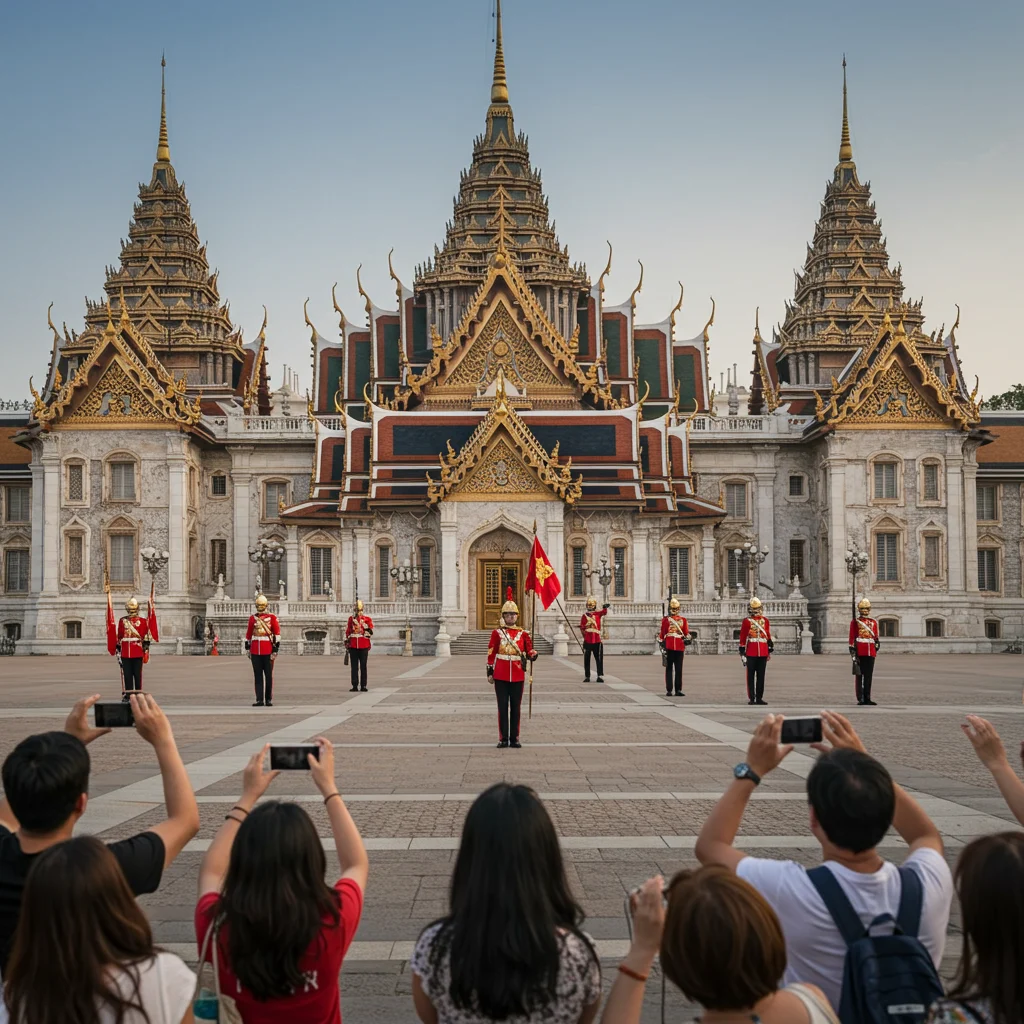
Whether you are a first-time visitor or a lifelong admirer of royal ceremonies, this tour promises to leave you with a deeper appreciation for the rituals that shape national identity. At Unisho, we believe that cultural experiences like these create lasting memories and foster a greater understanding of the world. For more travel inspiration and expert advice, visit Unisho.
Disclaimer: This information is accurate to the best of our knowledge; however, there may be changes or mistakes. Please verify exact details on the Viator booking page.

